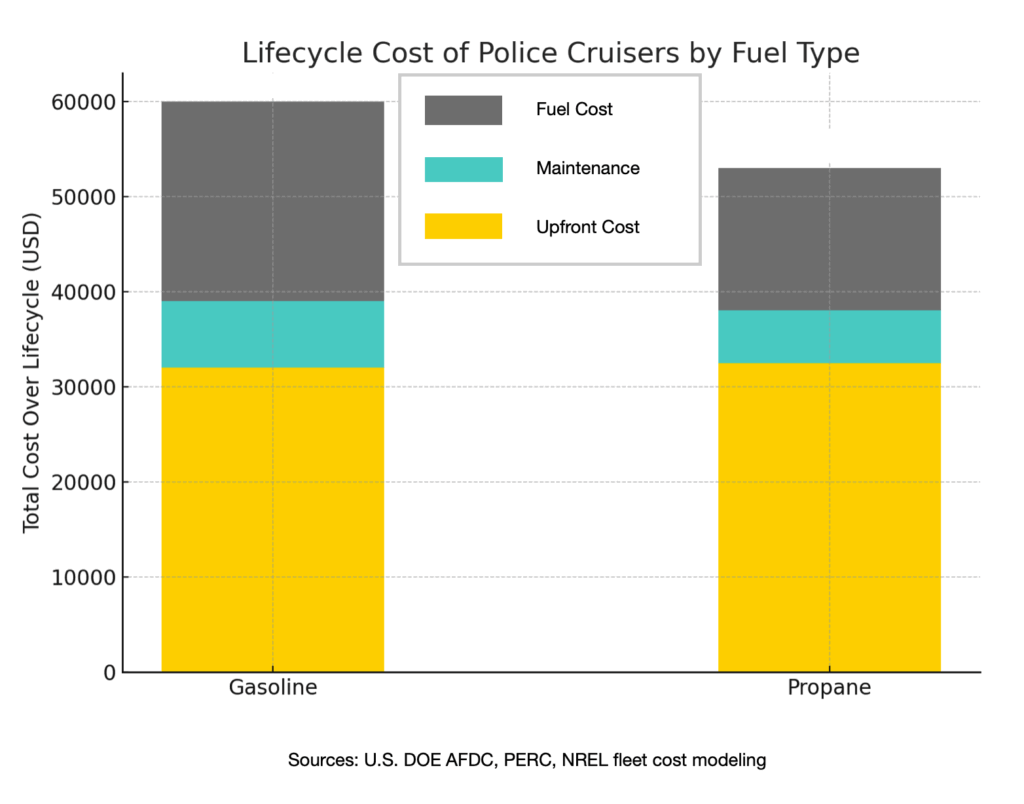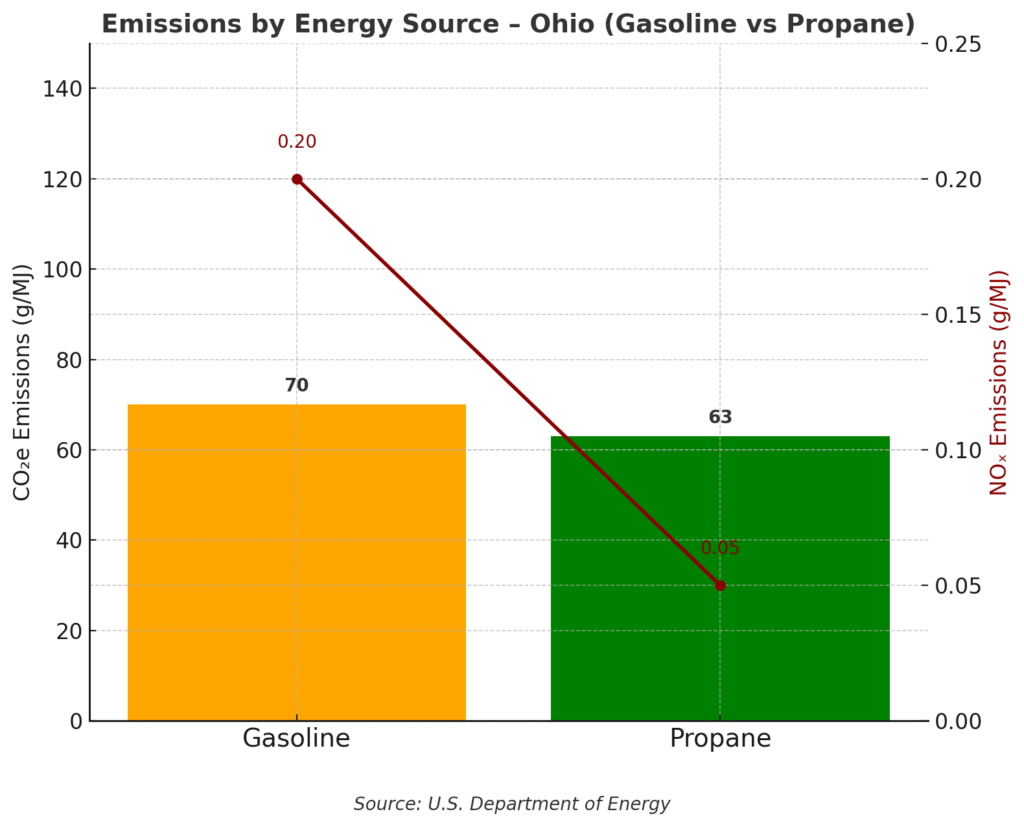Propane Vehicles Help Muskingum County Sheriff’s Office Reduce Fuel Costs and Emissions
Muskingum County Sheriff’s Office: The Benefits of Propane in Fleet Vehicles

Propane Police Cruisers – 20
Total Miles Driven Annually ~30,000
Savings – Fuel and Maintenance Costs
In 2015, the Muskingum County Sheriff’s Office converted two Taurus police interceptor vehicles to run on propane. From there, they added five to six cars to their fleet every year. Initially met with skepticism, Sheriff Matthew Lutz stated, “I was very skeptical back in ‘15 when we started this. And they brought down a demo car, and I took it for a drive. The performance, really, you don’t notice it.” However, the department has since proven that switching to propane-powered vehicles was a strategic and beneficial choice for the agency and the community. As of 2022, 20 of their 31 primary response vehicles, which handle all calls and respond to emergencies, run on low-emission propane.
Fuel and Maintenance Savings That Add Up
A key benefit of propane is its substantial cost savings.
For example, propane costs less per gallon than gasoline, and since it is a clean fuel, it puts less strain on the engine. That means fewer maintenance issues, fewer service disruptions, and more reliable service.
Additionally, Sheriff Lutz highlighted the financial advantages, stating, “Manufacturers rate the propane tanks for around 18 years, and we plan to transfer them to new vehicles after six years of use. This system aims to provide significant cost savings over time.”
Of course, the initial cost of installing propane conversion kits ranges from $7,000 to $9,000; however, the long-term savings are substantial, particularly in fuel and maintenance costs.
Furthermore, Captain Jeff LeCocq, a Deputy at the Sheriff’s Office, offered additional insights, noting, “We go 7,500 miles between oil changes, whereas before, we were doing 3,000-mile intervals on gasoline.” Clearly, this significant extension in oil change intervals is a testament to the cleaner operation of propane engines.
Finally, LeCocq also noted, “We haven’t experienced any reliability issues. These cars are just as easy to maintain as our regular gasoline-powered vehicles.”
“Yeah, the fuel cost savings was huge. It was kind of a really a knockout punch to hear that kind of thing and know that we could have that savings immediately. And we're getting the performance we need.”
Sheriff Matthew Lutz, Muskingum County Sheriff Department
Cutting Emissions and Improving Operations
Environmental benefits are another compelling reason for the switch. For instance, propane is a low-carbon, nontoxic alternative fuel that won’t contaminate air, soil, or groundwater. Drivers around the world use propane as the third most common transportation fuel, after gasoline and diesel. Moreover, the U.S. Department of Energy officially classified it as an alternative fuel under the Energy Policy Act of 1992. By reducing their carbon footprint, the Muskingum County Sheriff’s Office contributes to a healthier environment for their community.
In addition to environmental gains, propane also improves operational efficiency. The department keeps the vehicles’ factory gasoline tanks, creating a bi-fuel system. Consequently, This setup lets them switch seamlessly between propane and gasoline when needed. This flexibility allows the department to continue operations without interruption, even when one fuel source runs out.
Sheriff Lutz said in an interview with the Ohio Propane Gas Association, “The safety factor, the performance factor, all that stuff played a role in our decision to switch to propane. It helps keep our engines cleaner, makes them last longer on these cars, and not to mention the last thing, it’s green, it’s going green, it’s saving our community and trying to make a better place.”
Propane–A Safe Fuel
Propane-powered vehicles are a safe and proven choice for city fleets. More than 30,000 propane-powered vehicles are already on the road in Ohio. Their fuel tanks are built to withstand rigorous conditions, made from carbon steel, and designed to meet the strict safety standards of the American Society of Mechanical Engineers. Propane tanks are 20 times more puncture-resistant than gasoline or diesel tanks, giving drivers and parents extra peace of mind.
Propane autogas has a narrower flammability range than gasoline and diesel, reducing the risk of accidental ignition. Additionally, every onsite propane fueling station is equipped with a lock-off valve that automatically stops the flow of propane if a pressure drop is detected anywhere in the system, providing an extra layer of safety for police cruiser fleets.
Sheriff Lutz mentioned in regards to safety, “Adding a tank to the cruiser, you know, obviously our cars are involved in crashes and we’ve actually had two or three cars that have been totaled that had propane on them and there was no issues.”
$16,000 Available from the Ohio Propane Gas Association
With budget constraints and a big push to transition Ohio’s fleets to cleaner fuels, the Ohio Propane Gas Association is here to help. The OPGA is offering fleets up to $16,000 to help them immediately reduce their carbon footprint with their propane vehicles. The OPGA has experts to help fleet managers, city officials, and police chiefs make the transition as smooth as possible.
Learn more at: OhioAutogas.com/#rebate


